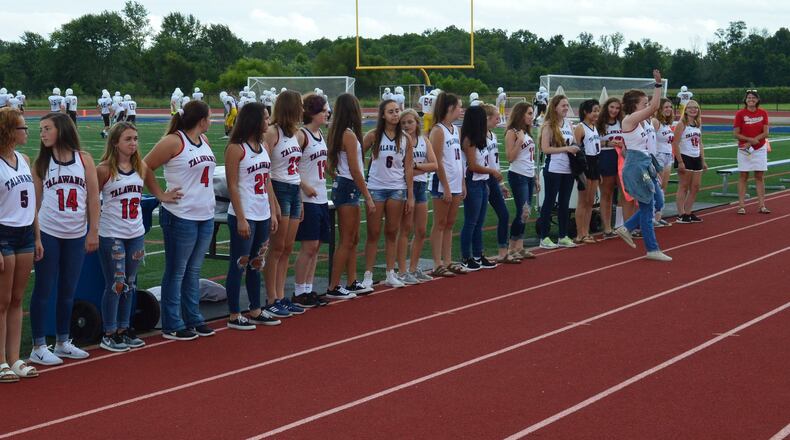She mentioned the group of residents who have asked the board of education for some changes in the athletic program to bring a new climate—and success—to Talawanda teams.
“I’m putting my time where everybody’s mouth is,” she said with a smile.
As a Talawanda graduate and athlete, she said her reason for seeking the open field hockey coaching position was to find the success she has seen in the past.
“We went to state my senior year (at Talawanda) and made the quarterfinals,” she said. Thinking about the victory bell just inside the fence at Talawanda’s stadium, Holmes said, “My goal is to ring the bell.”
Her first time coaching the sport at her alma mater was 1985 to 1987, then she went to Venezuela for two years and coached there. Back in this country, she coached in Miami, Florida for three years.
In between, she played at Bowling Green State University but her playing career was cut short when the school dropped the program. While a lot of her college teammates left the school, she stayed to work on her education degree
Her coaching in Florida was not on the field hockey field but she led a cheerleading team which made it to the national championships in Los Angeles three years in a row, finishing second. Another highlight for her cheer teams was being able to cheer at halftime of Miami Heat games.
Back in Oxford after that experience, she returned to the Talawanda field hockey coaching post from 1993 to 1998 and her teams made it to the state quarterfinals twice in that period.
Holmes said there is enthusiasm and excitement among her players this year with a young squad working hard to get better.
“It’s a large team. We have 29 but I would like it more like 35,” she said, noting the varsity roster has 14 players and the junior varsity 15, although there will be crossovers throughout the season. “It’s still open to freshmen. We have five freshmen, but I would much rather have ten.”
Still, that roster is heavy with sophomores and juniors which she said is good for the future of the sport at Talawanda. There are 13 sophomores on the roster.
“I told the sophomores to build toward their senior year and maybe you can be the King Kong team,” she said. “We have four first-time players who are sophomores or juniors. That’s exciting. There are six seniors. There should be eight, but two did not stay with it.”
A bonus for this year’s team is a foreign exchange student from Chile who comes here “very skilled” in the sport.
Field hockey is a sport often dependent on players talking to their friends about joining the team, often after school starts, in order to round out the roster. Of course, that makes for inexperience, something Holmes hopes to prevent by going back to what she has done in the past, creating a feeder system for the sport with young players.
“Unlike soccer and volleyball, field hockey starts with ninth graders,” she said, noting that she hopes to introduce the sport to younger girls. “It’s wonderful to have older kids help younger kids in a feeder program. I just want to get back to what we used to do.”
She hopes to restart a spring field hockey league at the TRI which she used in past years to introduce the sport and its skills to girls as young as fourth grade. She also wants to start a sports camp for field hockey at the high school.
A fundraising effort may also be in the future to take teams to summer camps at colleges for working together on skills.
She said the current team has taken part in voluntary summer conditioning work for two hours, two days a week since June with about half the players there each time. Those sessions were held at 7:30 a.m. to avoid the heavy heat of the day and she was pleased with the participation.
Seniors on this year’s varsity roster are Olivia Baker, Charlotte Benzing, Alexis Clayton, Hannah Kresse, Libby Paulsen and Toni-Marie Reece.
Juniors currently listed on the varsity squad are Fernanda Conejeros, Josie Keith and Madlyn Manning. Sophomores on that roster are Rita Armitage, Kylie Brosey, Ava Wetzel, Rita Zhou Wang and Abby Zmuda.
Since the team will play on the school’s artificial turf field, Holmes said she has worked to get practice time scheduled there rather than on a grass field because different stick-handling techniques will be needed for the turf field where balls travel faster.
“It’s a really good group of hard-working people…and thoughtful,” the coach said, explaining they were practicing one morning when the cross country team was out on a run and it started to rain. “They wanted to get the cross country kids’ stuff out of the rain.”
About the Author
